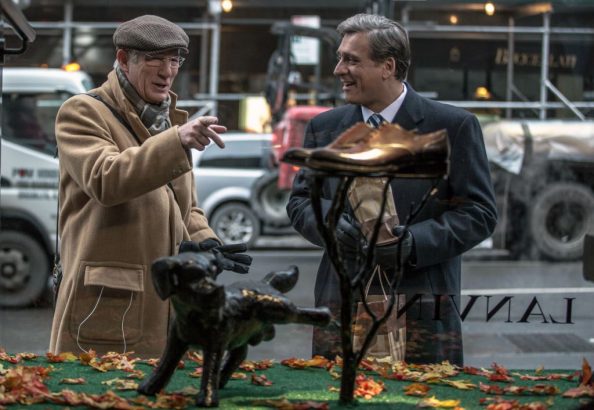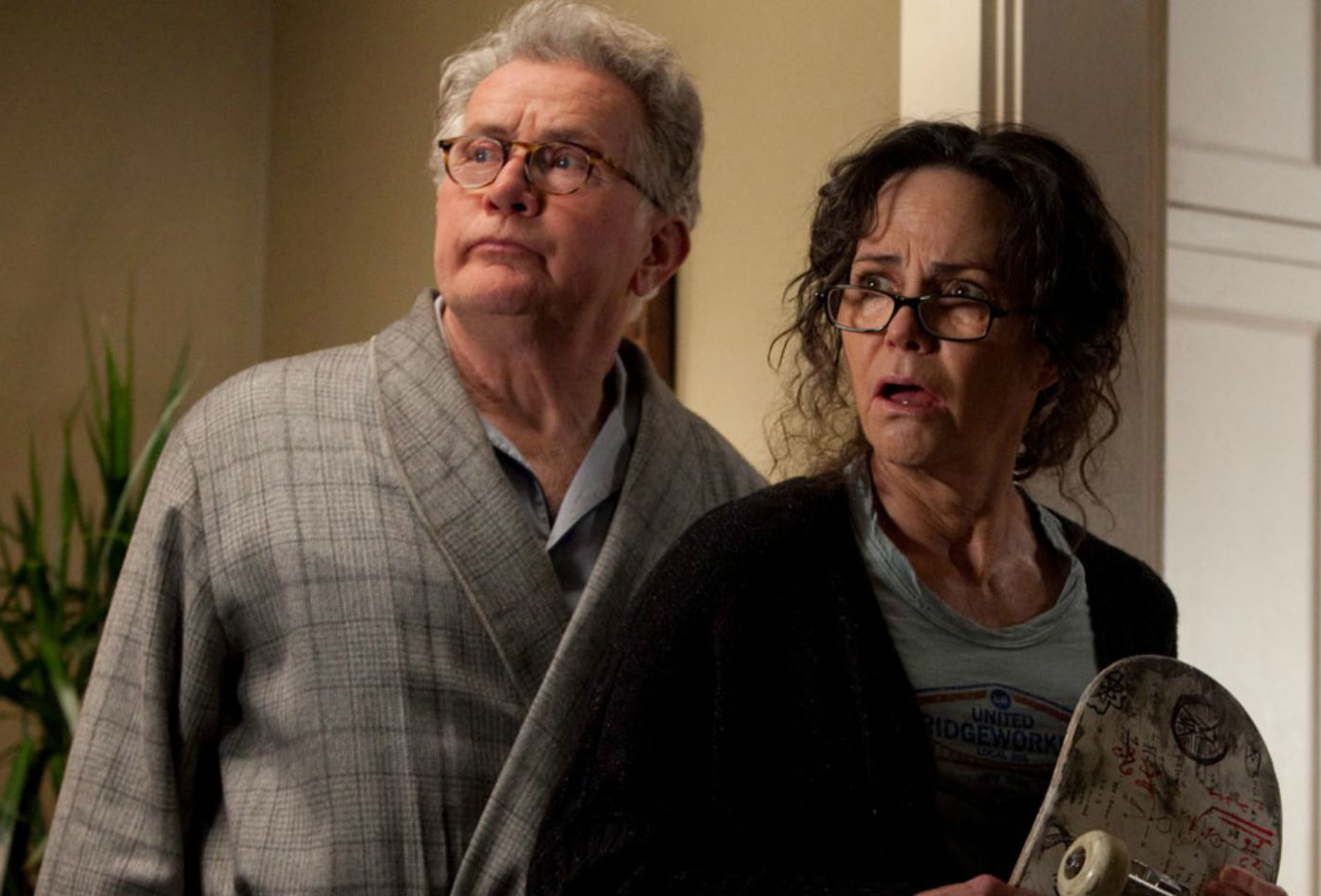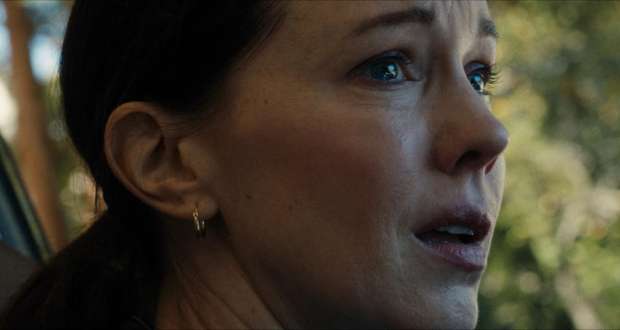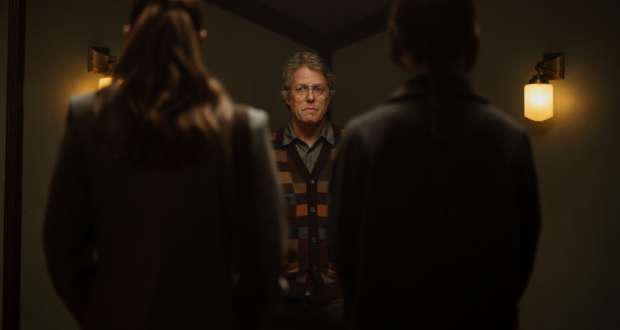Genre: Drama
Writer/Director: Joseph Cedar
Length: 1 hour 58 minutes
Cast: Richard Gere, Lior Ashkenazi, Martin Sheen, Charlotte Gainsbourg, Dan Stevens, Hank Azaria, Josh Charles, Steve Buscemi
Reviewer: Connie Wilson
Richard Gere has been doing good work in films since the seventies, with a peak period culminating in 1982 (“Looking for Mr. Goodbar,” 1977; “Days of Heaven,” 1978; “Bloodbrothers,” 1978; “Yanks,” 1979; “American Gigolo,” 1980; “ and “An Officer and a Gentleman,” 1982). Gere staged a comeback, of sorts, with “Pretty Woman” in 1990. Now sixty-eight, Richard seems to have discovered indie movies (or they have discovered him) with 2 new films out that display his acting chops, not just his good looks. (People’s “Sexiest Man Alive” of 1999). First, there’s “Norman” and (opened May 5th), also, “The Dinner.”
Joseph Cedar’s first American language film, a joint production with Israel, is “Norman: The Moderate Rise and Tragic Fall of a New York Fixer.” Cedar, who was born in New York City and is a graduate of the New York University Film School, lived in Israel from the age of five. He has previously directed four films there, and co-star Lior Ashkenazi, who plays the Prime Minister of Israel in this one, was in Cedar’s last film, “Footnote.”
With “Norman: The Moderate Rise and Tragic Fall of a New York Fixer” Cedar has interwoven his understanding of how the Jewish community in New York works, with the story of a “macher” in New York City. (“Macher:” a fixer, a would-be Big Whig, a wheeler-dealer, someone who connects others to get things done). It’s a truly enjoyable, original, interesting film with a plot that keeps you on your toes and some of the best work Gere has done in decades.
 Richard Gere turns in a performance that puts Norman Oppenheimer somewhere between pushy chatterbox and pathetic loser with pretensions. (When I heard the surname Oppenheimer, I immediately thought of the creator of the atomic bomb, but this name was actually a nod to Joseph Sues Oppenheimer, an eighteenth century fixer for a powerful German duke.) Norman never seems to have an office, but he is always on his cell phone. He mentions a wife and daughter, but we have no idea whether that biographical data is true. Some things Norman tells others we recognize instantly are Big Fat Lies, while others are more difficult to determine. One character—Steve Buscemi’s Rabbi Blumenthal— even says directly to Norman’s face, “Why do I get the feeling that nothing you tell me is real?”
Richard Gere turns in a performance that puts Norman Oppenheimer somewhere between pushy chatterbox and pathetic loser with pretensions. (When I heard the surname Oppenheimer, I immediately thought of the creator of the atomic bomb, but this name was actually a nod to Joseph Sues Oppenheimer, an eighteenth century fixer for a powerful German duke.) Norman never seems to have an office, but he is always on his cell phone. He mentions a wife and daughter, but we have no idea whether that biographical data is true. Some things Norman tells others we recognize instantly are Big Fat Lies, while others are more difficult to determine. One character—Steve Buscemi’s Rabbi Blumenthal— even says directly to Norman’s face, “Why do I get the feeling that nothing you tell me is real?”
I drew the conclusion that Norman seems to constantly dissemble in order to make himself appear more important, not unlike the current resident of the White House, who talked about his “close friend Pavarotti” seemingly without realizing that Pavarotti had been dead for years. Norman is a name-dropper; he rises from insignificant to significant and back again in the course of this 2-hour film. Even when Norman just seems to be a low-level pest who, as the film opens, is harassing an up-and-coming broker out for his morning run in Central Park (played by the “Beast” actor Dan Stevens as Bill Kavish) Norman is constantly talking—perhaps too much for his own good, as we learn during the course of the film.
There are so many unanswered questions about Norman: How does he survive? Is he living on money inherited from his mother in her rent-controlled apartment? If so, how can he afford the expensive ($1,291) pair of shoes he insists on gifting to an up-and-coming Israeli Minister, Mischa Eschel (Lior Ashkenazi), who expresses great gratitude.
Three years later, Eschel is Prime Minister of Israel, and remembers his friend Norman publicly, which boosts Norman’s stock considerably around town. But “be careful what you wish for,” as the old saying goes. Norman’s good fortune may also prove to be his downfall.
Director/Writer Cedar has a good grasp of the intricacies of his plot and his characters. He divides the film up into four parts: Act I – A Foot in the Door; Act II – The Right Horse; Act III – The Anonymous Donor and Act IV = The Price of Peace. There’s even some ruminating on the nature of friendship when the new Prime Minister’s wife says, “He’s not your friend. He’s someone you take advantage of when it’s convenient.” (How many of us can nod our head knowingly at those words of wisdom?) Mischa’s wife tempers her harsh judgment by adding, “Maybe it’s unconscious.” By film’s end, a discussion of the true nature of “friendship” might be merited, provoked by the intricacies of the plot.
 In the midst of all this, comes a discussion of the need for a $14 million donor for the neighborhood synagogue; the need for someone to grease the skids at Harvard so the Israeli Prime Minister’s son can gain entry; the gift of a pair of expensive shoes from a New York City haberdashery; a dinner invitation to a Big Whig’s house (one who has his own small basketball court within his New York City condo) and other miscellaneous components. Cedar has woven an intricate mosaic, a character study like the films of the seventies, (before explosions and car chases and Marvel Comic book heroes were all that mattered to audiences).
In the midst of all this, comes a discussion of the need for a $14 million donor for the neighborhood synagogue; the need for someone to grease the skids at Harvard so the Israeli Prime Minister’s son can gain entry; the gift of a pair of expensive shoes from a New York City haberdashery; a dinner invitation to a Big Whig’s house (one who has his own small basketball court within his New York City condo) and other miscellaneous components. Cedar has woven an intricate mosaic, a character study like the films of the seventies, (before explosions and car chases and Marvel Comic book heroes were all that mattered to audiences).
The music (Jan Miyaka) and Cinematography (Yaron Scharf) are top-notch and, while there have been comparisons to the loopy character studies of the Coen Brothers, this film, for me, was very reminiscent of several Israeli films I reviewed at last year’s Chicago International Film Festival. There is definitely humor, but there’s so much more than just bizarre personalities afoot in this film.
It’s refreshing to have an adult film with an intricate plot, not only well-acted by Gere, but ably supported by such great character actors as Josh Charles (late of “The Good Wife”), Steve Buscemi, Hank Azaria, Martin Sheen, Charlotte Gainsbourg, Dan Stevens and the accomplished Israeli actor Lior Ashkenazi, who was in the director’s last film, as well. I’m definitely looking forward to “The Dinner,” Gere’s political thriller (opened May 5th). It will be the 40th Richard Gere film I’ve seen and “Norman” and “The Dinner” look like they will make up for such long-ago stinkers as “King David” and “Power.”
-
Acting - 10/10
10/10
-
Cinematography - 10/10
10/10
-
Plot/Screenplay - 10/10
10/10
-
Setting/Theme - 9/10
9/10
-
Buyability - 7/10
7/10






















